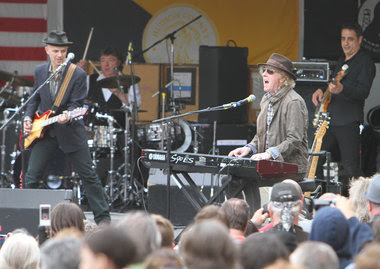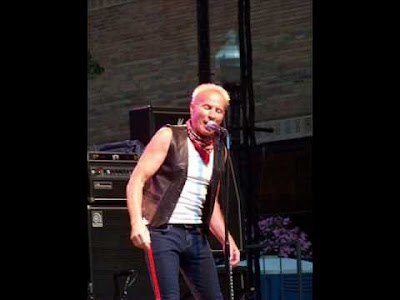When I'm President may be Ian Hunter's best solo album since his first. It's a bold return to brash rock, but you never lose the sense that the onetime frontman of the greatest show on earth quit writing for an audience decades ago. Still, there's not a writer who speaks for us all more eloquently. He might write in a dark room sans shades, but when he sings we listen.
Ian Hunter's voice is one of the most intensely loved instruments in rock history. Maybe not loved by countless millions, but deeply loved by those that count - the real lovers of rock. The voice is still in fantastic shape, and he's stretching his vocal cords out more on this record than he has in ages. The Rant Band is one fire, providing the strongest backing Hunter's had in decades. Guitarist Mark Bosch joins the celebrated corps of six stringers (The Micks - Ralphs and Ronson, Luther Grosvenor/Ariel Bender, and Andy York) who have always kept Hunter more in the realm of rock star than singer/songwriter. His sharp, melodic soloing is riveting, and there's more great guitar work here than we've seen on a Hunter disc in ages.
At 73, Hunter would be forgiven for not going full stop, but if anything, he sounds decades younger than his age. He's still pulling out new tricks, and the band sounds like it's trying to keep up with their leader more than the other way around.
Comfortable (Flyin' Scottsman) kicks thing off with a bit of barroom rock that harkens back to the days when Hunter still called the UK home. His voice is remarkable, and the rockin' guitars, horns, and piano remind us that Mott The Hoople wasn't a good band, they were a great band. This takes you right back to 1974.
"The songs seem to be more upbeat this time round. The last two albums were pretty political, just because I thought the Bush years were horrible, and thankfully that's passed. But I don't go looking for songs; I have to wait for them to come to me. I had a spurt there in the summer of 2011, and that grew into this album. I'd get up every day with something ringing in my head, so I'd try to catch it and get it down. Songwriting's always been a mystery to me in that way. Now and again you're nearer the sun, and you have to be ready to capture it." Ian Hunter.
Fatally Flawed carries on Hunter's penchant for writing lyrics that offer much more than meets the eye. A slow simmering rhythm & blues shuffle goes hard rock heavy - Bosch turns it up for a psycho-distortion lead that resolves into some soulful bends, as Hunter intones:
A loping single string guitar melody reminiscent of Hunter and Ronson's 1981 classic, Central Park n' West climbs over a nicely plucked intro by co-guitarist James Mastro rings in the title track - When I'm President continues Hunter's autobiography via song, and it's amongst his finest chapters. The Rant Band is all over this record with the ganged background vocals that made their leader's earlier groups so charming. He's always the alien yet when he invokes the names of America's past presidents, you're ready to change the constitution and cast your votes. Hunter for President? Hell, yes."Fatal flaws like to breed,
inside addictive personalities.
By her bed she opens up a drawer,
and there's bottle full of them,
Fatal Flaws."
Hunter and The Rant Band cut this record in record time - they didn't mess around, they grouped up and laid it down, and it sounds like it. This thing bristles with good energy from beginning to end, and you can tell that this bunch aren't strangers. They've had a few good years to get to know Hunter, and they get better, tighter, and more exciting with each release. Let's hope for more, and soon.
Ian Hunter has become increasingly more political as the years have gone by, largely given to living in a land in which is going to hell in a hand basket, but not still young enough to learn from its failures, unlike his home country England. Over the last two albums, his politics seem to be becoming more personal than governmental, but make no mistake, the man is still laying down truths the likes we've not heard since Dylan meant something.
If swaggering rock thrills ya, What For is what ya came for. This is Hunter's best rocker in twenty years. His pen is razor sharp, and his voice is incredible. If you told me I could sing like this at 73, I'd kiss your ass, and thank you for the privilege. The band is raging and the joint is rockin'.
Black Tears is the most melodic Hunter since the '80s. It's a bluesy rock tune with enough 'Broadway' to win the hearts of Hooples everywhere. This tune sounds like nothing in the Hunter canon, it's way too bluesy and way too heavy (in a way we've not seen since Ariel Bender's genius on 1974's The Hoople album, but it obviously came from the familiar pen. This is a new trick and it opens up another avenue in which the man can weave his magic. Bosch is hall of fame worthy here, and he just heaps on tasty line after tasty line. Brilliant, and new. Who could ask for more?
I'm going to stop there with the song reviews - now it's time for you to put on your cap and find out for yourself that great albums are still being made. I will tell you that Ta Shunka Witco (Crazy Horse) is a wonderfully conceived tribute that hits the mark, and that I Don't Know What You Want From Me is another almost insanely good Hunter tune that feaures his son Jesse on an amazing lead vocal.
OK, I have to tell you about Life. It closes the album - a melodic ballad that sees Hunter waxing in a nostalgic way unheard since Saturday Gigs, and Michael Picasso. No one has ever written more thoughtful rock than Ian Hunter, and this is another great one. He speaks so well of the human condition - he's always given us more smiles than he allows himself, and we are ever the richer for his gifts.
I'm sure that there are better things in life than great albums by living legends, but right now, I can't imagine what they'd be."I hope you had a good time,
I hope your time was as good as mine.
My you're such a beautiful sight.
I can't believe after all these years,
Your still here and I'm still here,
Laugh, because it's only Life."
Thank you, Ian Hunter - I remember once giving a roadie a well worn copy of your book, Diary of a Rock and Roll Star outside the FM Station in North Hollywood, in hopes of getting it signed. You popped your head out, saying, "Oh, so you're the one who bought it." You then invited me in and I've stayed ever since. Thanks for the great trip. If it weren't for your words, I'd not be writing today.










































